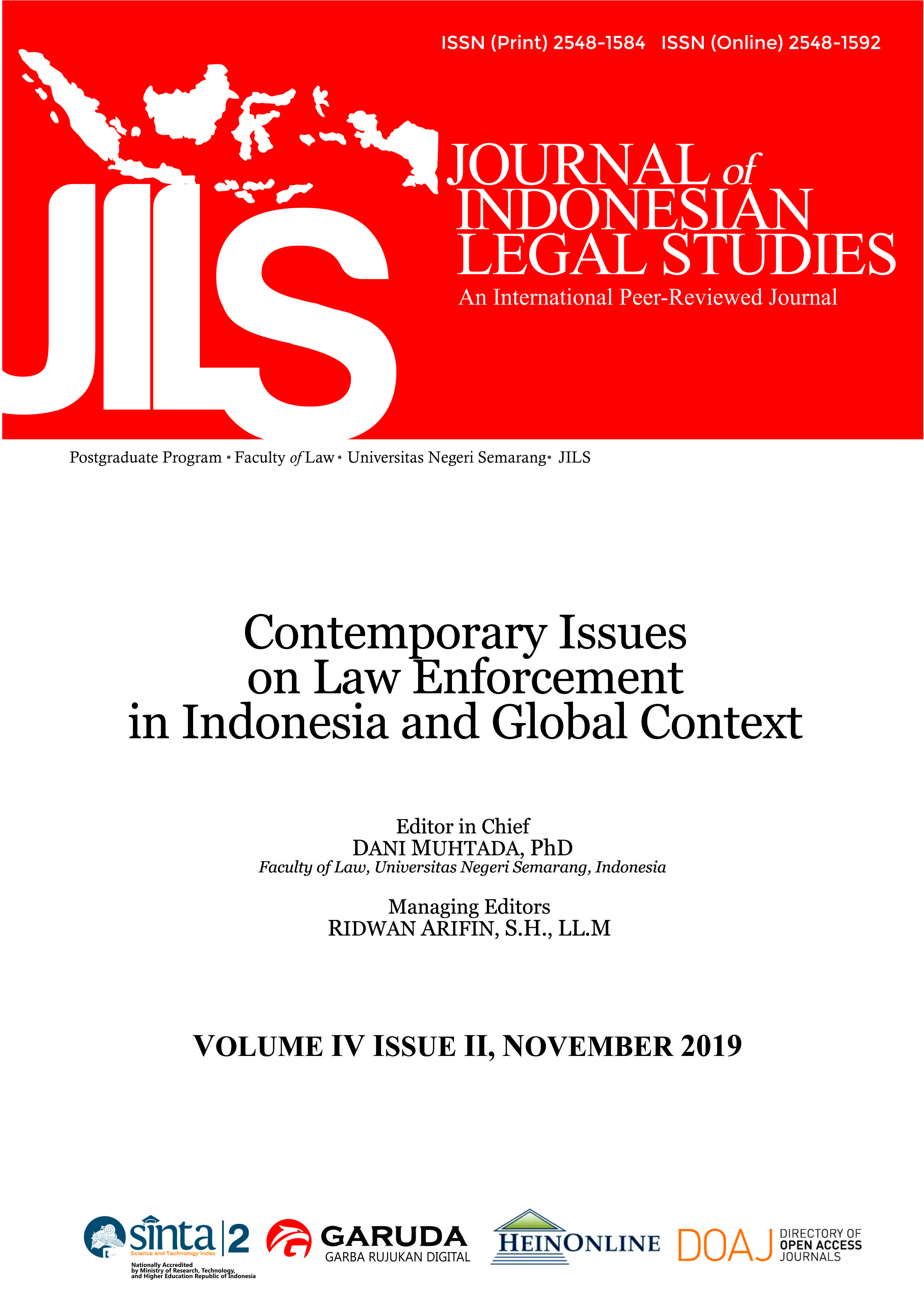How Should Student Behave? A Legal Ethics and Policy towards Nationalism and Anti-Radicalism Characters
Main Article Content
Abstract
The university has become an important place in the cultivation of character for generations in many countries. Many universities in the world also apply a variety of systems in making policies to shape the character of campus communities, including students. This study aims to analyze legal and ethical policies for students in fostering an attitude of nationalism and anti-radicalism. This study also aims to describe the various forms of implementation of student ethics policies that are applied in the Faculty of Law, Semarang State University, Indonesia. This study uses a qualitative method with direct data collection through observation and interviews. This study bases its analysis on the theory of the operation of Lawrence M Friedman's law. The results of this study indicate that legal and ethical policies for students are interpreted by a variety of different interpretations both between managers and students. Various cases of inequality of perception lead to pros and cons. However, this research proves that the implementation of legal ethics and student character policies have been regulated in various rules, both at the national level (ministerial regulation), university level (rector regulation), and faculty level (dean regulation) all of which emphasize on forming attitudes nationalism and anti-radicalism.
Article Details

This work is licensed under a Creative Commons Attribution-ShareAlike 4.0 International License.
All writings published in this journal are personal views of the authors and do not represent the views of this journal and the author's affiliated institutions. Author(s) retain copyrights under the licence of Creative Commons Attribution-ShareAlike 4.0 International (CC BY-SA 4.0).
References
Atamimi, A., & Hamid, S. (1990). Peranan Keputusan Presiden Republik Indonesia dalam Penyelenggaraan Pemerintahan Negara; Suatu Studi Analisis Mengenai Keputusan Presiden yangerfungsi Pengaturan dalam Kurun Waktu Pelita I–Pelita IV, Disertasi Ilmu Hukum Fakultas Pascasarjana Universitas Indonesia, Jakarta.
Dunn, W.N. (2003). Pengantar Analisis Kebijakan Publik. Yogyakarta: Gadjah Mada University Press.
Edward III George C. (1980). Implementing Public Policy. Washington: Congressional Quarterly Press.
Fajar, M., & Yulianto, A. (2010). Dualisme Penelitian Hukum Normatif & Empiris. Yogyakarta: Pustaka Belajar.
Farida, M. (1998). Ilmu Perundang-Undangan, Yogyakarta: Kanisius.
Hidayat, N. (2017). Rujukan dan Aplikasi Sistem Hukum Indonesia Berdasarkan Pasal 1 Ayat (3) UUD 1945 Pasca Amandemen Ke Tiga. UIR Law Review, 1(2), 191-200.
Istighfarani, D. (2015). Peningkatan Hasil Belajar IPS Melalui Model Mind Mapping Menggunakan Media Jarum Perjuangan Di Kelas V SD Negeri Sokawera. FKIP, Universitas Muhamadiyyah Purwokerto.
Jensen, C. et al. (2018). Policy implementation in the era of accelerating projectification:Synthesizing Matland’s conflict–ambiguity model and research on. Public Policy and Administration, 33(4), 449.
Nuraisyah, N. (2016). Penerapan Nilai-Nilai Akhlak Dalam Peraturan Dan Hukum Formal (Studi Terhadap Kode Etik Mahasiswa STAIN Bukittinggi Tahun 2014). Alhurriyah: Jurnal Hukum Islam, 1(1)
Nurhardianto, F. (2015). Sistem Hukum dan Posisi Hukum Indonesia. Jurnal TAPIs, 11(1).
Panduan Akademik Universitas Negeri Semarang Tahun 2018
Patton, M.Q. (2006). Metode Penelitian Kualitatif. Yogyakarta: Pustaka Belajar.
Laws and Regulation
Rector Regulation Semarang State University Number 44 of 2018 concerning Ethics and Rules of Order of Semarang State University Students [Peraturan Rektor Universitas Negeri Semarang Nomor 44 Tahun 2018 tentang Etika dan Tata Tertib Mahasiswa Universitas Negeri Semarang].
Law Number 12 of 2011 concerning the establishment of Laws and Regulations [Undang-undang Nomor 12 Tahun 2011 tentang pembetukan Peraturan Perundang-undangan].
Law Number 12 of 2012 concerning Higher Education [Undang-undang Nomor 12 Tahun 2012 Tentang Pendidikan Tinggi].
Regulation of the Minister of Research and Technology and Higher Education Number 49 Year 2016 Regarding the Statute of Semarang State University [Peraturan Menteri Ristek Teknologi dan Pendidikan Tinggi Nomor 49 Tahun 2016 Tentang Statuta Universitas Negeri Semarang].
